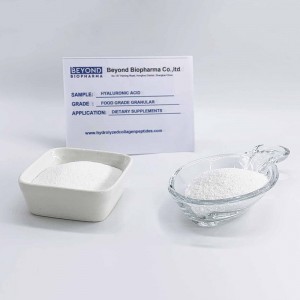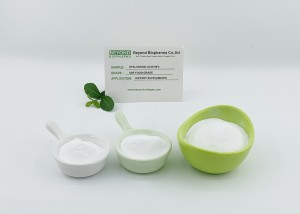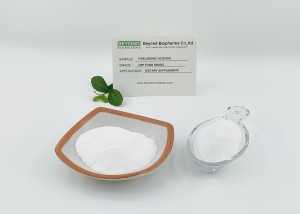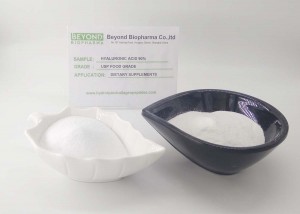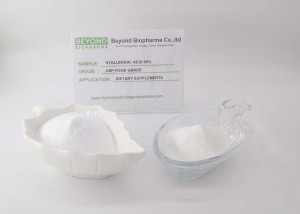Hyaluronic acid is a key ingredient in moisturizing the skin
| Material name | Food grade of Hyaluronic acid |
| Origin of material | Fermentation origin |
| Color and Appearance | White powder |
| Quality Standard | in house standard |
| Purity of the material | >95% |
| Moisture content | ≤10% (105°for 2hours) |
| Molecular weight | Around 1000 000 Dalton |
| Bulk density | >0.25g/ml as bulk density |
| Solubility | Water Soluble |
| Application | For skin and joint health |
| Shelf Life | 2 years from production date |
| Packing | Inner packing: Sealed Foil bag,1KG/Bag, 5KG/Bag |
| Outer packing: 10kg/Fiber drum, 27drums/pallet |
Hyaluronic acid is a kind of polysaccharide widely found in human tissues, It is particularly rich in skin, joint fluid, eyeball vitreous and other parts. Hyaluronic acid, with the chemical name of polyglucuronic acid, is a long chain molecule composed of repeated disaccharide units. It has extremely high water absorption and can bind a large amount of water, so it plays an important role in maintaining the elasticity and lubrication of the tissue.
In the skin, hyaluronic acid helps keep it hydrated, making it look plump and smooth. As you get older, the body gradually decreases, which causes the skin to lose elasticity, wrinkles and relaxation. Therefore, hyaluronic acid is widely used in cosmetics and skin care products for moisturizing and anti-aging.
In the medical field, hyaluronic acid also has many uses. For example, it can be used as an injection filler for soft tissue filling to improve facial wrinkles and contour defects. In addition, hyaluronic acid is also used in the treatment of arthritis. By injecting it into the joint cavity, it can increase the viscosity of the joint fluid, reduce the joint friction, and relieve the pain.
Hyaluronic acid is a multifunctional biological macromolecule, which has been widely used in medical, beauty, food and other fields. With the development of science and technology, new uses and new functions of hyaluronic acid are still being discovered and developed, and it will continue to play an important role in human health and life.
| Test Items | Specification | Test Results |
| Appearance | White Powder | White Powder |
| Glucuronic acid, % | ≥44.0 | 46.43 |
| Sodium Hyaluronate, % | ≥91.0% | 95.97% |
| Transparency (0.5% water Solution) | ≥99.0 | 100% |
| pH (0.5% water solution) | 6.8-8.0 | 6.69% |
| Limiting Viscosity, dl/g | Measured value | 16.69 |
| Molecular Weight, Da | Measured value | 0.96X106 |
| Loss on Drying, % | ≤10.0 | 7.81 |
| Residual on Ignition, % | ≤13% | 12.80 |
| Heavy Metal (as pb), ppm | ≤10 | <10 |
| Lead, mg/kg | <0.5 mg/kg | <0.5 mg/kg |
| Arsenic, mg/kg | <0.3 mg/kg | <0.3 mg/kg |
| Bacterial Count, cfu/g | <100 | Conform to the standard |
| Molds&Yeast, cfu/g | <100 | Conform to the standard |
| Staphylococcus aureus | Negative | Negative |
| Pseudomonas aeruginosa | Negative | Negative |
| Conclusion | Up to the standard | |
First of all, hyaluronic acid has a very strong moisturizing ability. It can absorb and lock in moisture to keep the skin moist. Hyaluronic acid molecules can attract hundreds of times the weight of its water, forming a protective film, reduce the evaporation of water, thus effectively alleviating dry skin problems.
Second, hyaluronic acid helps to improve the elasticity of the skin. As the age increases, the hyaluronic acid content in the human body will gradually decrease, leading to a loss of skin elasticity, wrinkles and relaxation. Through exogenous hyaluronic acid, can restore the skin fullness and elasticity, make the skin look younger.
In addition, hyaluronic acid also has a certain antioxidant effect. It can help resist free radicals and slow down the aging process. Free radicals are one of the main causes of skin aging. Hyaluronic acid can neutralize free radicals and help to maintain the healthy state of the skin.
Hyaluronic acid can also promote skin repair and regeneration. It is able to stimulate cell growth and repair, accelerate wound healing, and reduce scar formation. For damaged skin, the use of hyaluronic acid can promote the skin to restore its original healthy state.
In beauty and skin care products, hyaluronic acid is usually used as a filler to reduce wrinkles and fine lines. It can fill the sunken part of the skin and smooth the surface of the skin. In addition, the use of hyaluronic acid can also improve the skin quality, make the skin become more delicate and smooth.
First of all, hyaluronic acid has a very strong moisturizing ability. It absorbs and locks in water, and is more effective than other moisturizing ingredients such as glycerin. This moisturizing effect not only helps to keep the skin moist, but also reduces the fine lines and wrinkles caused by dryness, making the skin look smoother and younger.
Second, hyaluronic acid has good biocompatibility. It is a polysaccharide substance that naturally exists in human skin, joints and other tissues, so when used in cosmetics, it rarely causes allergic reaction or discomfort, and is suitable for all kinds of skin types, including sensitive skin.
In addition, cosmetic grade hyaluronic acid also has a certain repair and anti-inflammatory effect. It can promote the repair of skin cells, accelerate wound healing, and reduce skin inflammation, to improve skin problems such as acne, erythema and so on.
The molecular weight of hyaluronic acid varies. The hyaluronic acid used in cosmetics is usually low molecular weight, which can more easily penetrate into the deep skin and play its moisturizing and repairing role. High molecular weight hyaluronic acid is mostly used on the skin surface to form a protective membrane to prevent water loss.
In the medical field, the application of hyaluronic acid is very widespread. It can be used as a viscoelastic agent in eye surgery, helping to maintain the shape of the eyeball and protect the cornea and retina. In orthopedic surgery, hyaluronic acid is used as a joint lubricant to help relieve pain in patients with arthritis. In addition, hyaluronic acid has also been used as skin fillers for repairing wrinkles and improving skin depressions, as well as as tissue fillers in some surgeries.
In the pharmaceutical industry, hyaluronic acid, as a drug carrier, can improve the stability of the drug and prolong the time of the drug action in the body. It can also be used in the preparation of sustained-release drugs to improve efficacy and reduce side effects by controlling the rate of drug release.
In the food industry, hyaluronic acid, as a natural food additive, has good moisturizing and stable energy, and is used to improve the taste of food and extend the shelf life. For example, it is added to some fudge, jelly, and drinks to increase the elasticity and texture of the product.
In the veterinary field, hyaluronic acid is also used in arthritis treatment in animals, helping to improve joint function and reduce pain in animals.
In addition, hyaluronic acid is also widely used in the field of biotechnology. It can serve as a component of the cell culture medium to aid in cell growth and proliferation. The biocompatibility and biodegradability of hyaluronic acid makes it an ideal material for tissue engineering and regenerative medicine.
In the agricultural field, hyaluronic acid can be used as a soil conditioner to increase the water retention capacity of soil and improve soil structure, thus improving crop yield and quality.
Injection: Hyaluronic acid injection is mainly used in the field of medical beauty, to improve skin wrinkles, depressions and contour through filling and shaping. It is also used in the arthritis treatment to increase the lubrication of the joint fluid.
Skin care products: In the cosmetics industry, hyaluronic acid is widely added to a variety of skin care products, such as face creams, essence, facial mask, etc. It helps the skin retain moisture, reduce fine lines, and increase its elasticity and luster.
Ophthalmological medication: Hyaluronic acid is used in ophthalmic surgery because of its good moisturizing properties, such as adjuvant treatment after cataract surgery, and as a component of artificial tears, to relieve dry eye symptoms.
Oral care products: In the field of oral care, hyaluronic acid is added to toothpaste, mouthwash and other products to help repair the oral mucosa, reduce inflammation, and keep the mouth moist.
Food additives: As a kind of food additive, hyaluronic acid can be used to improve the taste and water retention of food, which is common in jelly, jelly and other foods.
Can I have small samples for testing purposes?
1. Free amount of samples: we can provide up to 50 gram of hyaluronic acid free samples for testing purpose. Please pay for the samples if you want more.
2. Freight cost: We usually send the samples via DHL. If you have DHL account, please let us know, we will send via your DHL account.
What are your Ways of shipment:
We can ship both by air and be sea, we have necessary safety transportation documents for both air and sea shipment.
What is your standard packing?
Our standarding packing is 1KG/Foil bag, and 10 foil bags put into one drum. Or we can do customized packing according to your requirements.






